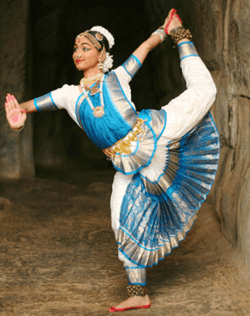Jewellery of Tamil Nadu
Tamil people[1] are fond of golden jewellery, which has a history long before Sangam period. Ancient Tamil literature list out what are the different types of jewellery worn by women from top to toe on those days. That can be very well evidenced from the sculptures we find today. Apart from gold, jewelries were made of silver, copper and brass.

Tamil annai (The Mother Tamil) is praised by ornamenting her with The Five Great Epics of Tamil Literature.
சிரமதில் திகழ்வது சீவக சிந்தாமணி - (Civaka Cintamani, jewellery on forehead)
செவிகளில் மிளிர்வது குண்டலகேசி - (Kundalakesi, stud on ear)
திருவே நின் இடையணி மணிமேகலையாம் - (Manimegalai, girdle on waist)
கரமதில் மின்னுவது வளையாபதியாம் - (Valayapathi, bangle on hand)
கால் தனில் ஒலிப்பது சிலப்பதிகாரம் - (Silappatikaram, anklet on foot)
கண் கண்ட ஐம்பெரும் காவியத்திலகமே
They have the tradition of decorating Hindu deities with gold ornaments that even followed today in all the temples. The deities are decorated and before going out for a procession they stood the deity in front of a mirror to show them the perfection. The jewelries are well designed with intrigued work and laid with diamonds and all kiinds of gems (navarathnam), not only gold but also silver ornaments. Gold is considered as very precious metal of all and Goddess Lakshmi. So they wore gold above their waist and use silver ornamnets below their waist.
Jewelries for head
Kreedam, golden crown worn by Deities and Kings, studded with precious stones and gems.
Nethi chutti or Vagupu chutti or Chutti,[2] Jewel for the forehead.
Rakkadi, used in the backhead, to hold the bunch of lengthy soft hair spun and tied)
Surya & Chandra Pirai, Sun & Moon shaped ornamental jewel used to decorate their forehead.
Jadanagam used to tie the hair band from back side.
Pattam, tied by both bride and groom during wedding on their forehead.
Kandasaram and Kechaparam are tied on the braid.
Thirugupoo, round ornament with screw like back used to wore on the backhead in the center.
Kunjam, women ties it at the end of braid. It stimulate long hair growth.
Jewelries for ear
Thodu, ear stud or ear rings.
Kadukkan, small stud with single stone for men.
Olai, large ear studs.
Pampadam,[3] gold earring with hallow balls and squares filled with lac. Worn by old ladies with big ear hole.
Maattal, chain shaped jewel used to hook in the hair from the ear ring stud or nose stud.
Lolakku, a designer jewel that hung from the ear stud.
Kundalam, ear ornament for both men and women.
Jimikki,[4] another ear stud.
Makara kuzhai, fish shaped ear ornament
Kadippu
Karnam
Saarpaipoo
Thandatti
Mudichi
Picharkal
Poodi
Jewelries for nose
Mookuthi, Nose stead (Mukkuthi).
Besari, a stud in gold with stone studded Nose stud or ear stead with a hanging design.
Bullakku, A designer jewel worn in the that hangs from the nose stead or ear stead.
Jewelries for neck
Thaali or Suthuru or Mangalyam,[5] groom ties around bride's neck during marriage that show the bondage between them. The shape differs accroding to the caste.
Addigai,[6] necklace like ornament worn very close to neck.
Aaram or Haram,[7] Necklace.
Maalai or Charam, Made of plain gold or pearls & corals.
Kaasu Maalai, long chain made of gold coins.
Maanga Maalai, long chain designed like mango(Paisley (design)) studded with stones and gems.
Vettrilai Kovai, bettel leaves shaped pendants on long chain.
Kodi Maalai, a chain made in the shape of leaves and plants of soft designs in plain gold.
Sangili, Chain made of gold only.
Kaarai, neck ornament
Contrakaram, moon shaped ornament for the chest. Listed out in Sangam literature 'Silapathikaram'.
Chavadi, five layers of chain.
Jewelries for hand
Valayal or Sarivu, bangles made up of plain gold or gold with stones or gems.
Kaikappu, bangles without designs known as Kappu
Mothiram or Neli, finger ring.
Vangi or Vanki,[8] armband.
Nagothu, Naga(snake) shape on vanki.
Kanganam (armband)
Tholvalai Kappu used in the shoulder to hold the sari.
Nagar or Nagam, A cobra shaped ornament used the upper arms.
Jewelries for waist
Oddiyanam,[9] waist belt used to tighten the sari, in the hip.
Aranaal, a chain shaped one used along with inner side of sari at hip.
Aranjanam or Araijnan Kayiru or Araijnan Kodi,[10] silver or gold chain for tie around the waist of infants or children and men even thick black or red thread will be used.
Arasala (Arasa ilai), pipal or sacred fig leaf like ornament with waist chain made up of gold or silver for babies (female).
Jewelries for foot
Silver ornaments wore below the waist are listed below
Silambu, ring shaped anklet, like hollow pipe that used to contain precious stones, silver balls, peral or coral beeds. The Sangam literature 'Silapathikaram' named after silambu.
Sathangai or Salangai, a series of small silver bells and worn in the anklet, used by classical dancers like Bharathanatyam dancers. Listed out in Sangam literature 'Silapathikaram'.
Metti or Minji or Peeli, groom place it on brides second finger from toe during wedding.
Kolusu (Anklet) made in silver with varieties of shape and design.
Thandai or Patharasam, same as Silambu but heavy.

Kaappu (Plain anklets)
Padakkam,listed out in Sangam literature 'Silapathikaram'.
Others
Kattuvanam
Batti
Gajjal
See also
References
- ↑ http://2.bp.blogspot.com/-Ltjq37C8hmY/UAwguzCVyrI/AAAAAAAARlg/unJM5NQJ50A/s1600/Studio+portrait+of+Three+Girls+wearing+jewellery+-+Madras+(Chennai),+Tamil+Nadu+1870's.jpg
- ↑ http://www.avrswarnamahal.com/collections/gold/gold-nethi-chutti.aspx
- ↑ http://www.ethnoarte.com/ethnoarte/categorie/Dprodotto.php?id=173&categoria=jewellery
- ↑ http://blog.gehnaindia.com/2012/07/06/traditional-jewellery-in-tamil-nadu/
- ↑ http://www.avrswarnamahal.com/collections/gold/gold-mangalyam.aspx
- ↑ http://www.gopaldasjewellers.com/Diamond-Necklace--Addigai-Necklace-869-11.aspx
- ↑ http://www.avrswarnamahal.com/collections/gold/gold-harams.aspx
- ↑ http://www.vummidi.com/jewellery-collections/diamond-jewellery/accessories/goddess-lakshmi-diamond-vanki.aspx
- ↑ http://www.vummidi.com/jewellery-collections/diamond-jewellery/accessories/oddiyanam.aspx
- ↑ http://www.tamilbrahmins.com/philosophy-traditions/3671-paramacharya-bhashyamrutam.html